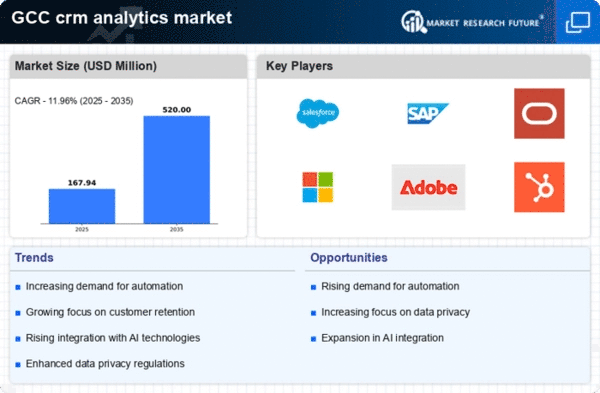Rising Demand for Customer Insights
The crm analytics market is experiencing a notable surge in demand for customer insights across various sectors in the GCC. Businesses are increasingly recognizing the value of data-driven decision-making, which is leading to enhanced customer engagement and retention strategies. According to recent estimates, the market for crm analytics in the region is projected to grow at a CAGR of approximately 15% over the next five years. This growth is largely attributed to the need for organizations to understand customer behavior and preferences better. As companies strive to tailor their offerings, the integration of advanced analytics tools becomes essential. Consequently, the crm analytics market is positioned to benefit from this trend, as firms invest in technologies that provide actionable insights into customer interactions.
Integration of Cloud-Based Solutions
The crm analytics market is witnessing a significant shift towards cloud-based solutions, which offer scalability and flexibility for businesses in the GCC. As organizations increasingly migrate their operations to the cloud, the demand for cloud-based crm analytics tools is expected to rise. This transition allows companies to access real-time data and analytics from anywhere, facilitating better decision-making processes. Reports indicate that the adoption of cloud technologies in the region is anticipated to reach 70% by 2026. This trend not only enhances operational efficiency but also reduces costs associated with on-premise infrastructure. As a result, the crm analytics market is likely to expand as more businesses seek to leverage cloud capabilities for improved customer relationship management.
Emergence of Advanced Predictive Analytics
The crm analytics market is being transformed by the emergence of advanced predictive analytics technologies. These tools enable businesses in the GCC to forecast customer behavior and trends with greater accuracy. By leveraging historical data and machine learning algorithms, organizations can identify potential opportunities and risks, allowing for proactive decision-making. The predictive analytics segment within the crm analytics market is projected to grow significantly, with estimates suggesting a CAGR of around 18% over the next few years. This growth is driven by the increasing need for businesses to stay ahead of market trends and enhance their competitive edge. As a result, the adoption of predictive analytics is likely to become a key driver for the crm analytics market.
Growing Focus on Personalization Strategies
In the crm analytics market, there is a growing emphasis on personalization strategies among businesses in the GCC. Companies are increasingly utilizing analytics to create tailored experiences for their customers, which is essential for driving loyalty and satisfaction. The ability to analyze customer data allows organizations to segment their audience effectively and deliver personalized marketing campaigns. It is estimated that personalized marketing can lead to a 20% increase in sales for businesses. As firms recognize the importance of individualized customer interactions, the demand for sophisticated crm analytics tools is expected to rise. This trend indicates a shift towards more customer-centric approaches, positioning the crm analytics market for substantial growth in the coming years.
Increased Investment in Customer Experience
The crm analytics market is benefiting from increased investment in customer experience initiatives across the GCC. Organizations are recognizing that enhancing customer experience is crucial for maintaining a competitive advantage. This focus on customer satisfaction is leading to higher investments in analytics tools that provide insights into customer journeys and touchpoints. It is projected that companies will allocate up to 30% of their marketing budgets towards improving customer experience by 2026. This trend underscores the importance of understanding customer needs and preferences, which in turn drives the demand for effective crm analytics solutions. As businesses strive to create seamless experiences, the crm analytics market is likely to see substantial growth.
















